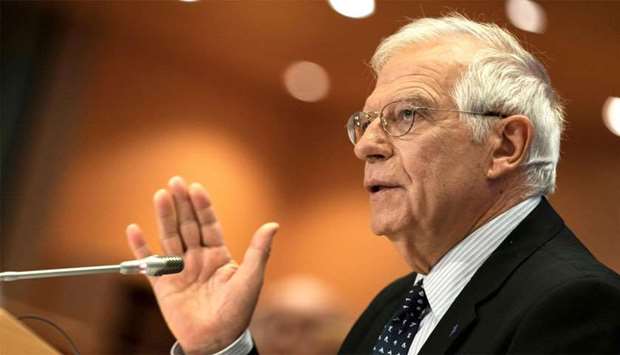The European Union must learn to ‘use the language of power,’ the bloc's designated top diplomat Josep Borrell told EU lawmakers on Monday, warning that the bloc must act as one or risk being squashed by the superpowers of the United States and China.
Borrell, who is Spain's foreign minister, has been picked to succeed Federica Mogherini as the EU's next foreign policy chief, due to take office on November 1.
However, he must be approved by the European Parliament as part of the team assembled by European Commission president-elect Ursula von der Leyen. Borrell will have a double role as a commission vice president and the direct envoy of all EU member states.
In the last 30 years, the world has ‘changed dramatically’ for the worse, Borrell said, noting that the international order is being ‘challenged by the logic of power politics, which is much more unfair, unpredictable and conflict-prone.’ Trade, technology and finance are being used as ‘political weapons,’ he added, noting that Europe is faced with ‘no certainty about the international role of the US,’ new threats from the East and a fragile neighbourhood, among other things.
‘This is not the world the EU wanted, but I am convinced we have what it takes to face this challenging environment,’ he said, describing the EU as a ‘financial superpower’ whose diplomatic capacities are among the strongest in the world.
However, Borrell urged the EU to pool national sovereignties and act as one on the global stage, describing the bloc's foreign policy approach as ‘policy-light and process-heavy.’ ‘To sum up in a single sentence: The European Union has to learn to use the language of power,’ the 72-year-old said.
He argued in favour of raising the EU's ambitions beyond the ‘lowest common denominator,’ suggesting that the bloc could start by scrapping its unanimity requirement on issues such as sanctions against Russia, human rights breaches and peace missions.
‘The sanctions against Russia must be maintained as long as there is no change in attitude,’ Borrell stressed, urging member states to remain united on this.
He backed the EU's decision not to join a US protection force in the volatile Strait of Hormuz, a key shipping lane for global oil supplies, arguing that the bloc should instead convene a regional conference for all parties to enter into dialogue.
‘Sending further naval forces at a time when circumstances might lead to a conflict being sparked off with unforeseeable consequences would not be the best solution,’ he told the parliament's foreign affairs committee.
Borrell, who is known for speaking his mind, went so far as to describe Washington's apparent green light for Turkey to intervene directly in Syria as ‘a problem’ and said he would push back against it, if in office.
He said it would be his ‘mandate’ to ensure implementation of Iran's nuclear deal aimed at preventing Tehran from developing nuclear weapons, despite the US withdrawal, calling the 2015 accord ‘the best achievement’ of EU diplomacy.
He also argued that the EU must step up its engagement in the Sahel area while creating channels for regular migration from Africa, noting that the current rate of arrivals in Europe is ‘not an invasion.’ Borrell, whose country does not recognize Kosovo's independence, said his first trip as foreign policy chief would be to Pristina.

